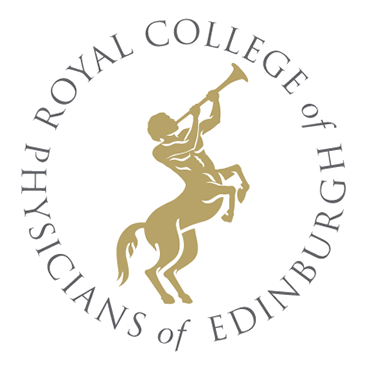
The Consultation Letters of Dr William Cullen (1710-1790) at the Royal College of Physicians of Edinburgh
[ID:1552] From: Dr Joseph Brandreth / To: Dr William Cullen (Professor Cullen) / Regarding: Mr T Dickson (Patient) / 26 August 1778 / (Incoming)
Letter from Joseph Brandreth regarding the case of Mr T. Dickson.
- Facsimile
- Normalized Text
- Diplomatic Text
- Metadata
- Case
- People
- Places
Facsimile
There are 4 images for this document.
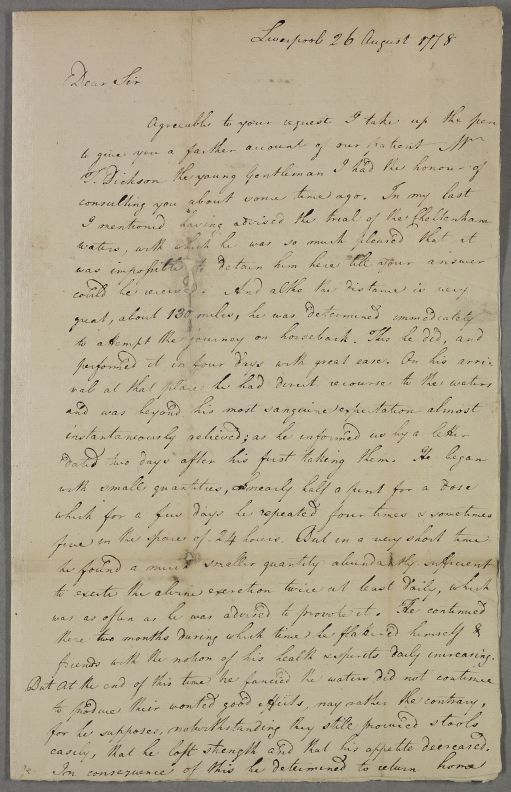
[Page 1]
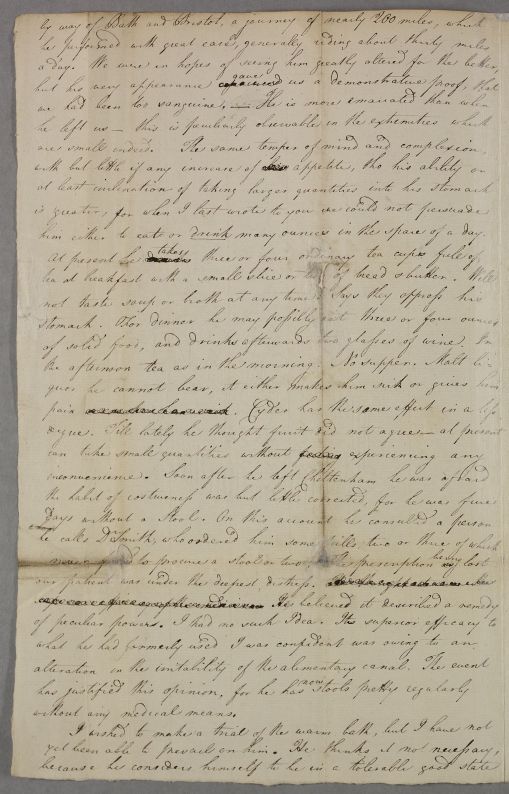
[Page 2]
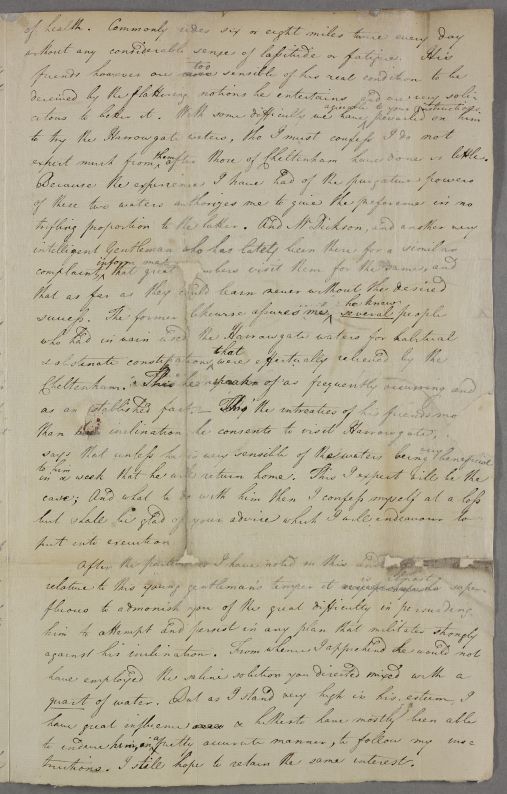
[Page 3]
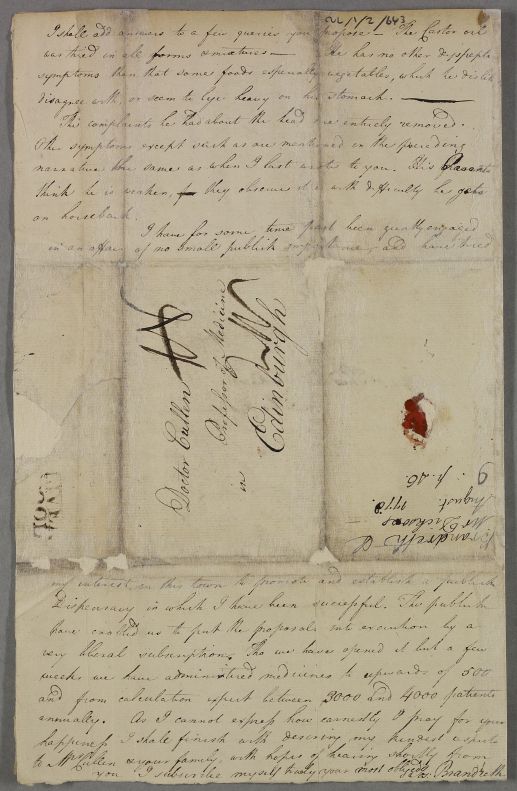
[Page 4]
Metadata
| Field | Data |
|---|---|
| DOC ID | 1552 |
| RCPE Catalogue Number | CUL/1/2/643 |
| Main Language | English |
| Document Direction | Incoming |
| Date | 26 August 1778 |
| Annotation | None |
| Type | Authorial original |
| Enclosure(s) | No enclosure(s) |
| Autopsy | No |
| Recipe | No |
| Regimen | No |
| Letter of Introduction | No |
| Case Note | No |
| Summary | Letter from Joseph Brandreth regarding the case of Mr T. Dickson. |
| Manuscript Incomplete? | No |
| Evidence of Commercial Posting | Yes |
Case
Cases that this document belongs to:
| Case ID | Description | Num Docs |
|---|---|---|
| [Case ID:1022] |
Case of Mr T. Dickson, an impetuous young man who suffers pains in his face and costiveness and who rides from his home in Liverpool to Cheltenham and on to Bath and then Bristol, and then Harrogate taking the waters in pursuit of health. |
5 |
People linked to this document
| Person ID | Role in document | Person |
|---|---|---|
| [PERS ID:2312] | Author | Dr Joseph Brandreth |
| [PERS ID:1] | Addressee | Dr William Cullen (Professor Cullen) |
| [PERS ID:2243] | Patient | Mr T Dickson |
| [PERS ID:2312] | Patient's Physician / Surgeon / Apothecary | Dr Joseph Brandreth |
| [PERS ID:3753] | Other Physician / Surgeon | Dr Smith |
Places linked to this document
| Role in document | Specific Place | Settlements / Areas | Region | Country | Global Region | Confidence |
|---|---|---|---|---|---|---|
| Place of Writing | Liverpool | North-West | England | Europe | certain | |
| Destination of Letter | Edinburgh | Edinburgh and East | Scotland | Europe | certain | |
| Therapeutic Recommendation | Cheltenham | South-West | England | Europe | certain | |
| Therapeutic Recommendation | Harrogate | North-East | England | Europe | certain | |
| Mentioned / Other | Bath | South-West | England | Europe | certain | |
| Mentioned / Other | Bristol | South-West | England | Europe | certain | |
| Place of Handstamp | Liverpool | North-West | England | Europe | certain |
Normalized Text
Agreeable to your request I take up the pen
to give you a further account of our patient Mr
S. Dickson the young Gentleman I had the honour of
consulting you about some time ago. In my last
I mentioned having advised the trial of the Cheltenham
waters, with which he was so much pleased that it
was impossible to detain here till your answer
could be received. And altho the distance is very
great, about 130 miles, he was determined immediately
to attempt the journey on horseback. This he did, and
performed it in four days with great ease. On his arri¬
val at that place he had direct recourse to the waters
and was beyond his most sanguine expectation almost
instantaneously relieved; as he informed us by a letter
dated two days after his first taking them. He began
with small quantities Snearly half a pint for a dose
which for a few days he repeated four times & sometimes
five in the space of 24 hours. But in a very short time
he found a much smaller quantity abundantly sufficient
to excite the alvine excretion twice at least daily, which
was as often as he was advised to provoke it. He continued
these two months during which time he flattered himself &
friends with the notion of his health and spirits daily increasing.
↑But↑ At the end of this time he fancied the waters did not continue
to produce their wanted good effects, nay rather the contrary,
for he supposes, notwithstanding they still procured stools
easily, that he lost strength and that his appetite decreased.
In consequence of this he determined to return home
[Page 2]
by way of Bath and Bristol, a journey of nearly 200 miles, which
he performed with great ease, generally riding about thirty miles
a day. We came in hopes of seeing him greatly altered for the better,
but his very appearance appeared↑gave↑ us a demonstrative proof, that
we had been too sanguine - He is more emaciated than when
he left us - this is peculiarly observable in the extremities which
are small indeed. The same temper of mind and complexion,
with but little if any increase of {illeg} appetite, tho his ability or
at least inclination of taking larger quantities into his stomach
is greater for when I last wrote to you we could not persuade
him either to eat or drink many ounces in the space of a day.
At present he {illeg} (↑takes↑) three or four ordinary tea cups full of
tea at breakfast with a small slice or two of bread & butter. Will
not taste soup or broth at any time. Says they oppress his
stomach. For dinner he may possibly eat three or four ounces
of solid food, and drinks afterwards two glasses of wine. In
the afternoon tea as in the morning. No supper. Malt li¬
quor he cannot bear, it either makes him sick or gives him
pain {illeg}. Cyder has the same effect in a less
degree. Till lately he thought fruit did not agree - at present
can take small quantities without feeling experiencing any
inconvenience. Soon after he left Cheltenham he was afraid
the habit of costiveness was but little corrected, for he was five
days without a Stool. On this account he consulted a person
he calls Dr Smith, who ordered him some pills, two or three of which
never failed to procure a stool or two. The prescription as (↑being↑) lost
our patient was under the deepest distress. {illeg}
{illeg} He believed it described a remedy
of peculiar powers. I had no such idea. Its superior efficacy to
what he had formerly used I was confident was owing to an
alteration in the irritability of the alimentary canal. The event
has justified this opinion, for he has ↑now↑ stools pretty regularly
without any medical means.
I wished to make a trial of the warm bath, but I have not
yet been able to prevail on him. He thinks it not necessary,
because he considers himself to be in tolerably good state
[Page 3]
of health. Commonly rides six or eight miles twice every day
without any considerable sense of lassitude or fatigue. His
friends however are more (↑too↑) sensible of his real condition to be
deceived by the flattering notions he entertains and are very soli¬
citous to better it. With some difficulty we have ↑agreeable to your instructions↑ prevailed on him
to try the Harrowgate waters, tho I must confess I do not
expect much from ↑them↑ after those of Cheltenham have done so little.
Because the experience I have had of the purgative powers
of these two waters authorizes me to give the [performance?] is no
trifling proposition to the latter. And Mr Dickson, and another very
intelligent Gentleman also has lately been there for a similar
complaint ↑informs me↑ that great [members?] visit them for the same, and
that as far as the could learn never without their desired
success. The former likewise assures me ↑he knew↑ several people
who had in vain used the Harrowgate waters for habitual
& obstinate constipations ↑that↑ were effectually relieved by the
Cheltenham. This he speaks of as frequently occurring and
as an established fact - Thro' the intreaties of his friends mo[re]
than {illeg} inclination he consents to visit Harrowgate, [but]
says that unless he is very sensible of the waters being ↑very↑ beneficial
↑to him↑ in a week that he will return home. This I expect will be the
case; And what to do with him then I confes myself at a loss
but shall be glad of your advice which I will endeavour to
put into execution.
After the {illeg} I have noted in this {illeg}
relative to this young gentleman's temmper it {illeg} (↑is almost↑) super¬
fluous to admonish you of the great difficulty in persuading
him to attempt and persist in any plan that militates strongly
against his inclination. For when I apprehend he would not
have employed the saline solution you directed mixed with a
quart of water. But as I stand very high in his esteem, I
have great influence {illeg} & hitherto have mostly been able
to induce him in ↑a↑ pretty accurate manner, to follow my ins¬
tructions. I still hope to retain the same interests.
[Page 4]
I shall add answers to a few queries you propose - The Castor oil
was tried in all forms & mixtures - He has no other dyspeptic
symptoms than that some foods especially vegetables, which he dislikes
disagree with, or seem to lye heavy on his stomach. ----
The complaints he had about the head were entirely removed.
The symptoms except such as are mentioned in the preceding
narrative the same as when I last wrote to you. His Parents
think he is weaker, for they observe it is with difficulty he gets
on horseback.
I have for some time past been greatly engaged
in an affair of no small publick importance, and have tried
my interest in this town to promote and establish a publick
Dispensary in which I have been successful. The publick
have enabled us to put the proposals into execution by a
very liberal subscription. Tho we have opened it but a few
weeks we have administered medicines to upwards of 500
and from calculation expect between 3000 and 4000 patients
annually. As I cannot express how earnestly I pray for you
happiness I shall finish with descring my kindest respects
to Mrs Cullen & your family, with hopes of hearing shortly from
you
Doctor Cullen
Professor of Medicine
in
Edinburgh
Brandreth Concerning
Mr Dickson -
August 1778
9. p.46.
Diplomatic Text
Agreeable to your request I take up the pen
to give you a further account of our patient Mr
S. Dickson the young Gentleman I had the honour of
consulting you about some time ago. In my last
I mentioned having advised the trial of the Cheltenham
waters, with which he was so much pleased that it
was impossible to detain here till your answer
could be received. And altho the distance is very
great, about 130 miles, he was determined immediately
to attempt the journey on horseback. This he did, and
performed it in four days with great ease. On his arri¬
val at that place he had direct recourse to the waters
and was beyond his most sanguine expectation almost
instantaneously relieved; as he informed us by a letter
dated two days after his first taking them. He began
with small quantities Snearly half a pint for a dose
which for a few days he repeated four times & sometimes
five in the space of 24 hours. But in a very short time
he found a much smaller quantity abundantly sufficient
to excite the alvine excretion twice at least daily, which
was as often as he was advised to provoke it. He continued
these two months during which time he flattered himself &
friends with the notion of his health and spirits daily increasing.
↑But↑ At the end of this time he fancied the waters did not continue
to produce their wanted good effects, nay rather the contrary,
for he supposes, notwithstanding they still procured stools
easily, that he lost strength and that his appetite decreased.
In consequence of this he determined to return home
[Page 2]
by way of Bath and Bristol, a journey of nearly 200 miles, which
he performed with great ease, generally riding about thirty miles
a day. We came in hopes of seeing him greatly altered for the better,
but his very appearance appeared↑gave↑ us a demonstrative proof, that
we had been too sanguine - He is more emaciated than when
he left us - this is peculiarly observable in the extremities which
are small indeed. The same temper of mind and complexion,
with but little if any increase of {illeg} appetite, tho his ability or
at least inclination of taking larger quantities into his stomach
is greater for when I last wrote to you we could not persuade
him either to eat or drink many ounces in the space of a day.
At present he {illeg} (↑takes↑) three or four ordinary tea cups full of
tea at breakfast with a small slice or two of bread & butter. Will
not taste soup or broth at any time. Says they oppress his
stomach. For dinner he may possibly eat three or four ounces
of solid food, and drinks afterwards two glasses of wine. In
the afternoon tea as in the morning. No supper. Malt li¬
quor he cannot bear, it either makes him sick or gives him
pain {illeg}. Cyder has the same effect in a less
degree. Till lately he thought fruit did not agree - at present
can take small quantities without feeling experiencing any
inconvenience. Soon after he left Cheltenham he was afraid
the habit of costiveness was but little corrected, for he was five
days without a Stool. On this account he consulted a person
he calls Dr Smith, who ordered him some pills, two or three of which
never failed to procure a stool or two. The prescription as (↑being↑) lost
our patient was under the deepest distress. {illeg}
{illeg} He believed it described a remedy
of peculiar powers. I had no such idea. Its superior efficacy to
what he had formerly used I was confident was owing to an
alteration in the irritability of the alimentary canal. The event
has justified this opinion, for he has ↑now↑ stools pretty regularly
without any medical means.
I wished to make a trial of the warm bath, but I have not
yet been able to prevail on him. He thinks it not necessary,
because he considers himself to be in tolerably good state
[Page 3]
of health. Commonly rides six or eight miles twice every day
without any considerable sense of lassitude or fatigue. His
friends however are more (↑too↑) sensible of his real condition to be
deceived by the flattering notions he entertains and are very soli¬
citous to better it. With some difficulty we have ↑agreeable to your instructions↑ prevailed on him
to try the Harrowgate waters, tho I must confess I do not
expect much from ↑them↑ after those of Cheltenham have done so little.
Because the experience I have had of the purgative powers
of these two waters authorizes me to give the [performance?] is no
trifling proposition to the latter. And Mr Dickson, and another very
intelligent Gentleman also has lately been there for a similar
complaint ↑informs me↑ that great [members?] visit them for the same, and
that as far as the could learn never without their desired
success. The former likewise assures me ↑he knew↑ several people
who had in vain used the Harrowgate waters for habitual
& obstinate constipations ↑that↑ were effectually relieved by the
Cheltenham. This he speaks of as frequently occurring and
as an established fact - Thro' the intreaties of his friends mo[re]
than {illeg} inclination he consents to visit Harrowgate, [but]
says that unless he is very sensible of the waters being ↑very↑ beneficial
↑to him↑ in a week that he will return home. This I expect will be the
case; And what to do with him then I confes myself at a loss
but shall be glad of your advice which I will endeavour to
put into execution.
After the {illeg} I have noted in this {illeg}
relative to this young gentleman's temmper it {illeg} (↑is almost↑) super¬
fluous to admonish you of the great difficulty in persuading
him to attempt and persist in any plan that militates strongly
against his inclination. For when I apprehend he would not
have employed the saline solution you directed mixed with a
quart of water. But as I stand very high in his esteem, I
have great influence {illeg} & hitherto have mostly been able
to induce him in ↑a↑ pretty accurate manner, to follow my ins¬
tructions. I still hope to retain the same interests.
[Page 4]
I shall add answers to a few queries you propose - The Castor oil
was tried in all forms & mixtures - He has no other dyspeptic
symptoms than that some foods especially vegetables, which he dislikes
disagree with, or seem to lye heavy on his stomach. ----
The complaints he had about the head were entirely removed.
The symptoms except such as are mentioned in the preceding
narrative the same as when I last wrote to you. His Parents
think he is weaker, for they observe it is with difficulty he gets
on horseback.
I have for some time past been greatly engaged
in an affair of no small publick importance, and have tried
my interest in this town to promote and establish a publick
Dispensary in which I have been successful. The publick
have enabled us to put the proposals into execution by a
very liberal subscription. Tho we have opened it but a few
weeks we have administered medicines to upwards of 500
and from calculation expect between 3000 and 4000 patients
annually. As I cannot express how earnestly I pray for you
happiness I shall finish with descring my kindest respects
to Mrs Cullen & your family, with hopes of hearing shortly from
you
Doctor Cullen
Professor of Medicine
in
Edinburgh
Brandreth C
Mr Dickson -
August 1778
9. p.46.
XML
XML file not yet available.
Feedback
Send us specfic feeback about this document [DOC ID:1552]
Please note that the Cullen Project team have now disbanded but your comments will be logged in our system and we will look at them one day...

